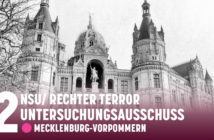The sixth day of the trial was dedicated almost exclusively to the testimony of the Carsten S. who has been accused with being an accessory to the murders. It became clear that the former high functionary of the NPD and the JN was himself involved in racist and Neo-Nazi violence and that he gave those in hiding important support. Today, and since he quit in the beginning of 2000, he struggles to identify the underlying motives of it all. His many, and sometimes quite contradictory, “memory gaps” could indicate he is playing down his guilt. At the same time S. is the only accused that has, so far, always been willing to answer questions.
At 9:45 the accused enter the courtroom, followed at around 9:50 by the court. The Presiding Judge Götzl would like to, after attendance, start right away with a continuation of the testimony of the accused Carsten S that began on June 4.
However before this representative of the Co-Plaintiff attorney Bliwier asks again about the previous question, concerning if officials from the Federal Criminal Police, the State Criminal Police or the Internal Security Agency are present in the courtroom. This is claimed to also be relevant in regards to the current testimony of Carsten S because he belongs to the witness protection program of the Federal Criminal Police. It is obvious that the ongoing testimony can be observed, as the case may be, yet due to what S says, they could also be considered as witnesses. Attorney Diemer replies that no one here could reasonably think that the authorities would send potential witnesses into the courtroom as observers. The risk of repeal is too great. Representative of the co-plaintiff Pinar replies “Mr. Diemer, you can not be serious!” She could search out document records, also from the Federal Supreme Court where this was the subject. After further statements from the co-plaintiffs Judge Götzl announced that the motion to monitor with regularity which of the aforementioned authorities are present in the courtroom has been declined. As he had stated already in the last meeting, there is in terms of the principle of a public trial, a lack of concrete evidence. Attorney Heer objects to this and asks for a court decision. Afterwards there is a recess for 15 min to make the decision. The decision was made at 10:20; the Senate confirms Götzl’s decision.
The trial continues with the continuing testimony of Carsten S. First he adds still further independent things to his testimony from yesterday, such as he had seen Uwe Böhnhardt already once, before he was in the scene. He remembers that his high boots were striking. He furthermore remembered, that there had been a conversation about the three fleeing to Nambia or South Africa. This had probably come up because there was a meeting in Jena with Claus Nordbruch (an extreme right wing publicist who lives in South Africa) and André K had also already visited there. Namibia is perhaps from his own memory because he had taken a calendar from the event of Namibia. He knew that he had visited with Wohlleben and the attorney Dr. Eisenecker (deceased right-wing attorney of the NPD). It could have been delegated, but he didn’t know exactly. There was a conversation with Tino Brande and the three, that was mentioned it in the documents, but he doesn’t remember anymore. Regarding the purchase of the weapon, he said that when Wohlleben sent him to Andreas S. that he was ordered to tell him that Wohlleben had sent him. In Chemnitz at the weapon exchange he had given a letter to the Uwes that had been sent to him in Winzerla, probably by the Family Mundlos, but he was not certain. Additionaly, he had visited Mundlos’ mother with Wohlleben at her work. There Wohlleben had assured her that everything was in order, that he, S. was with it. She had asked if everything was in order, Wohlleben confirmed. He told them of an instance when at a police check his ID had been returned with the mocking phrase “Mr. S. from New Delhi” The other members of the scene who were present had balked. But Christian K. resolved the situation by saying that Rudolf Hess had been born in Alexandria, and this was satisfactory. In 2001 after his departure from the scene some days he was followed by two or three cars. He was afraid that Wohlleben had turned the police on him. Later he went to the police and spoke with Jena State protection, afterwards the observation stopped.
Then he talked about an attack and its damages that he himself had taken part in. He had once, with others, at night attacked a Döner stand in Winzerla. Involved were Daniel S, who was also at the JN and a “Robbe” (for his first name Robert.) He had been involved in two further attacks on other Döner shops, where bricks were thrown. He also told the court about another attack on two people. Where his group of 7 to 9 people had come back from a carnival or something similar to Winzerla. There they had met up with a “Jimmy” who claimed that he had been insulted for being a Nazi. Then they had together walked to a wooden hut, where they found two people. Together they beat up the two people. He had also stepped up one or two other times. As he talks about kicking him there are briefly tears in his eyes. Götzl asks for a detailed description, such as if someone was injured. S, “I know that we then went away, we definitely went away taking care of it.” Later he had read, probably in the newspaper that the two people had been very badly injured. He then directs the case in the “direction of 98.” Here follows a long dialogue between Götzl and S where Götzl wants to find out the motives for his actions. But S. always wanders off into descriptions of the circumstances. He never utters the word “racism” or any synonyms. Instead he explains, he had responded well to right wing music and it was here he was invested. He talks a lot about alcohol consumption and further property damage such as emptying a fire extinguisher. Often “fun” stood in the foreground. Around the Rudolf-Hess Action week, when we had stickers pasted, “we saw there were no police there, then we plastered the Winzerla, that we later had to settle, we were annoyed.” He spoke about how the Döner stands were just “enemy stereotypes.” This thinking he does not explain, despite repeated requests from Götzl. The closest he comes to the issue of racism is when he states, “if a Bockwurst stand had stood there then we would not have knocked it over.” After further pressure from the Presiding Judge he says that the actions against the Kebab stands were based on ideas that “we had in the far right scene” and even these were just directed towards migrants. However he still doesn’t speak of himself. Finally Judge Götzl speaks of concrete “xenophobia” and asks if he identified with the ideas of the scene. He answers that “in certain ways I have accepted it, in a certain way I had also believed it.” In regards to conversations about politics or training he can not exactly remember if there were any S: “I know there were also Holocaust denial books, I didn’t concern myself with it…that didn’t stand in the foreground for me.” Gözl hooks into this area again, also because S. in the last session had described his exit from the scene very verbosely. S. claims it was primarily the sense of community and the idea of respect that had suddenly led him into this quarter. But he could no longer reconcile it with the problems that he had because of his unacknowledged homosexuality.
In the following testimony the pattern is repeated again and again. S. speaks about how he couldn’t remember that, that he could “not produce it again” and so on and so forth, or he says things like “ with Wohlleben and André K. I had to have had a good relationship.” (Concerning the choice of S as the trio’s contact person.) S. speculated even about the meaning of his personal relationship to the people from the time. He cannot or doesn’t want to remember particulars about what he valued back then or what his feelings and interpretations were. Chronology is often very difficult for him. The burglary of Zschäpe’s apartment for example, he had thought it was a year later until he read it in the case files. This leaves many questions unanswered in respect to the role he played. Judge Götzl asks about the relationship to the three. S. says that he basically had no relationship to them. Götzl wants to know what he knew about their living conditions or what he had considered. Had he no idea how or where the trio lived. Götzl asked again if he had any perceptions. S: “I think, I assumed that they lived somewhere.” They never went around to apartments therefore he had assumed that they were not looking. In regards to the question of what was discussed in the telephone conversations, he answered if there was nothing on the voicemail then they didn’t discuss anything. There were long periods where Wohlleben and him didn’t hear anything, but then they would hear from them again. Later he noted that he and Wohlleben were often annoyed by the activates of the three. He spoke in the testimony about how he frequently received an “order” from the three that he had to fulfill, but he had a rather friendly relationship to Wohlleben.
The in terms of the others accused, he did not know E. and he had rarely met G. “Once we had breakfast together, I remember that he smoked between the two halves of his breakfast roll.” “At a meeting at a bonfire on a shooting range we went together into the bushes to have a short confidential discussion about the trio.” He had to have a relationship of trust in connection those in hiding.
At noon a break for lunch was called, the trial continued again at 1:45
Görtz asks about the break-in at Zschäpes apartment. Why was Jürgen H. inaugurated as a look out here, it seems unclear to him, so Götzl asks S. if he had known that the apartment was not otherwise occupied? There they had flown the flag, that then was found at the break-in lying on the floor and they took it with, so some it must have been clear, says S. Götzl: “I am not content with that, to me that is not clear.” S says he had received his “order” to break in there it was assumed that the apartment was not otherwise occupied and they had done this. Götzl: “They use the passive. From whom came this order?” If you say it directly, then I don’t have to ask again. S says that he could not concretely remember the order. Why then did he take a risk on such a break-in asks Götzl. S. answers, “That somehow it belonged to it, I don’t know that I had discussed that. It was somehow clear that I should do it and that Jürgen should stand look out. Götzl asks where then the limit was of what they could have asked. S. can not remember. Götzl also asked if he also had had thoughts about why he should steal a motorcycle. S can’t answer this.
Then Götzl asks about the weapon hand over. What thoughts S had, what ideas he had, and what he thought would happen with this weapon. S replies that he has been asked this several times already and that he could not remember. He speculates that it may have had to do with financing the departure for those in hiding by means of a bank robbery. It seems plausible to him that he might have thought that back then. Götzl asked why the silencer was needed. S. says he knew that now, but it was with the weapon which he had received from Andreas S. Götzl “You didn’t have to bring the silencer?” S. said again, he could not remember. Götzl brought up his testimony from June 5, when everything was in order with the three. That such reflections could no longer be perceived as valid. Götzl suggests that S. must have engaged in many steps with the weapon. And he asked if S. actually could not remember. He did not receive a comprehensible answer.
Then he goes over once more the meeting with Beate Zschäpe to frame the weapon handover in Chemnitz. Götzl: There was talk that you had to sign something, what was that about?” He assumed it was from an attorney. After further questions he said he had only the memory that Zschäpe came extra for the signing. Götzl asks if that had something to do with the visit to attorney Eisenecker with Wohlleben. Afterwards S affirms this, he asked him if he had received the document there. He then negates S. Because how was he to receive these documents that were submitted to him by Zschäpe. He assumed that he received them from Wohlleben. S. “I had read in the document this lay a year between (the visit with) Eisenecker and (the meeting in) Chemniz, this appeared strange to me. I had connected both things together.” To the question, of what he should have done what with the documents, S. thinks that he had given them to Wohlleben but did not really know.
After this Judge Götzl has Carsten S. make available his interrogations with the investigating authorities. The reasoning for this is about contradictions or ambiguities between those statements and his current testimony. Among other things this conversation discovers that after his exit the trio had wanted to meet once more. Wohlleben had transmitted this request to S. however he refused. They had told him, among other things, that they would report that he had embezzled money that was intended for the purchase of phone cards. Once again, there is an inconsistency in hisown timeline regarding his meeting with attorney Eisenecker and the signature of the attorney’s authority.
At 3:10 there was a recess. The trial reconvened at 3:40.
Attorney Pausch, defense for S. asks if the interrogation can be interrupted. His client is not doing well. In addition the psychological expert Prof. Leygraf, who should examine his client, is not present at today’s proceedings, he must be able to create a picture of the testimony behavior in order to make a report. S. goes there, obviously in the greatest extent for clarification and investigation into his memory.
They agree to a recess and to continue in the morning with the testimony of accused G.
The proceedings end at 3:50.
In a press release from June 5, 2013, the attorneys for the co-plaintiffs Sebastian Scharmer and Peer Stolle say about the testimony behavior of Carsten S:
Attorney Stolle explains as follows:
„The validity of the memory gaps is not comprehensible. He would obviously dodge the questions about the political background of his former deeds. He was a high functionary of the NPD and the JN, an often racist organization. It was obviously an ideology he often had heard. His elusiveness has to be explained, in that he doesn’t say everything that he knows.“
Attorney Scharmer explains as follows:
“Its hard to believe that Carsten S, for example, remembers what color his pants were at the weapon exchange but does not know any more if he had ever considered the purpose of getting a hot weapon with ammunition and a silencer. Carsten S described in detail his coming out, communicating his own feelings with a kind of psudo-therapudic diction, but when it comes to his previous disposition he wants to know nothing concrete. We had hoped for an honest and complete testimony, in order to clarify the conditions of the foundation and support for the NSU. We are still far away from that. We will see how Carsten S. behaves in further questioning.”


